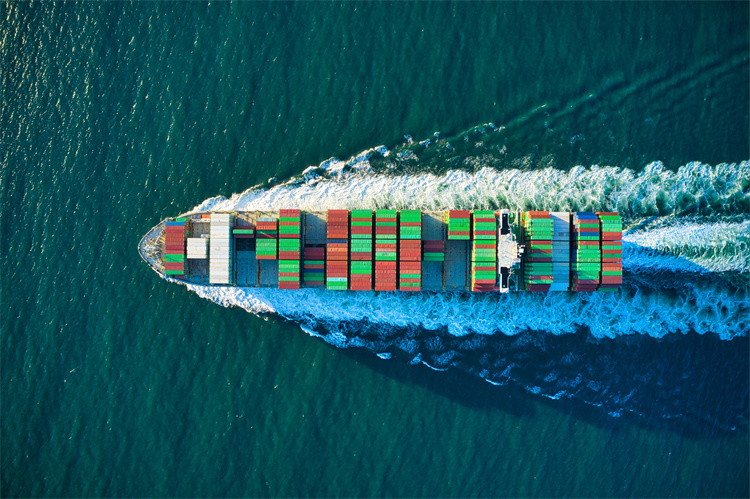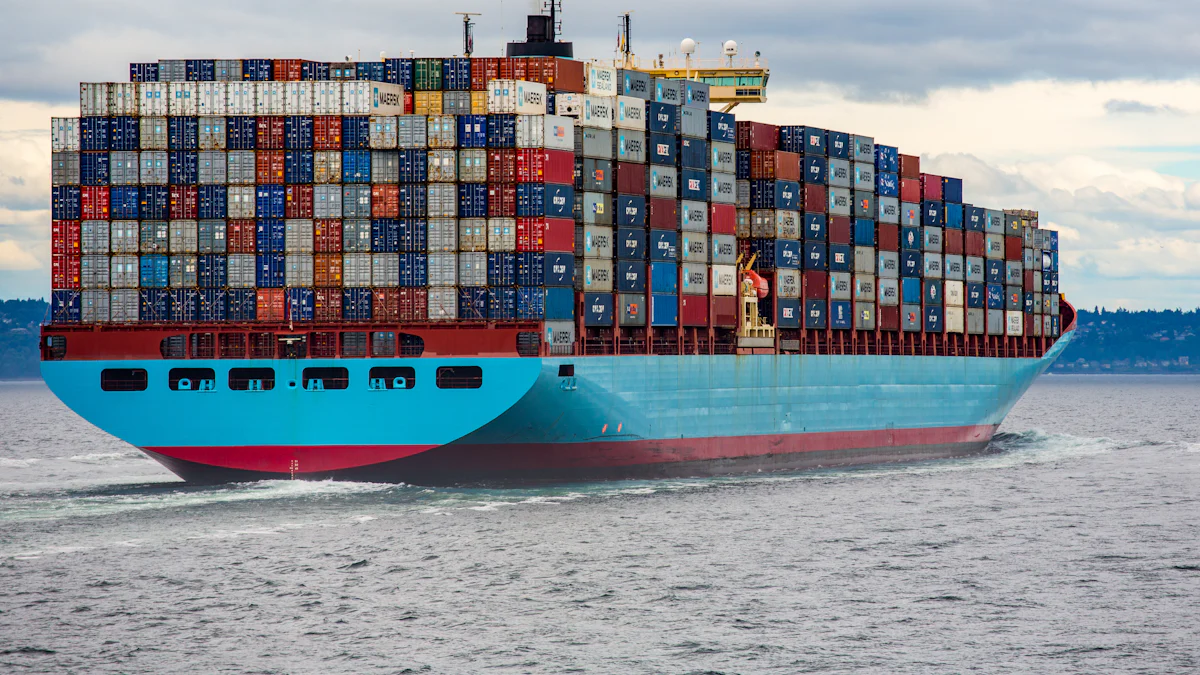Top 5 Shipping Lines: A Service Comparison

Profiles of the Top 5 Shipping Lines play a crucial role in global trade, facilitating the movement of goods across continents. In 2024, the world saw a total export volume of over $24 trillion and imports surpassing $21 trillion. These staggering figures underscore the importance of efficient shipping services. Selecting the top 5 shipping lines, which are Mediterranean Shipping Company (MSC), A.P. Moller – Maersk, CMA CGM, COSCO Group, and Hapag-Lloyd, involves evaluating service quality, coverage, and reliability. Comparing their services helps businesses make informed decisions. Understanding the differences among these top players ensures that companies choose the best partner for their specific needs.
Profiles of the Top 5 Shipping Lines

Company Profiles
Maersk Line
Maersk Line, a Danish international container shipping company, was established in 1904. The company owns 331 ships and charters 400 additional vessels. Maersk Line has a significant presence in the global shipping industry. The company focuses on providing reliable and efficient shipping services.
Mediterranean Shipping Company (MSC)
Mediterranean Shipping Company (MSC), founded in 1970, operates as a privately owned Swiss-Italian container shipping line. MSC manages more than 700 vessels annually, carrying around 23 million TEUs of cargo on over 250 routes. The company serves about 500 ports of call. MSC employs more than 100,000 people across 600 offices worldwide. MSC has achieved growth organically rather than through mergers or acquisitions.
CMA CGM Group
CMA CGM Group, founded in 1978, is a French container transportation and shipping company headquartered in Norfolk, Virginia, United States. The company operates a fleet of 566 vessels and serves 420 of the world’s 521 commercial ports. CMA CGM has a presence in 160 countries through 400 offices and 750 warehouses. The company employs 130,000 people and operates 257 shipping lines.
COSCO Group
COSCO Shipping Company, established in China in 1961, stands as one of the world’s leading maritime transportation service providers. The company operates a fleet of over 500 vessels. COSCO Shipping employs over 118,000 people. The company offers container, bulk, and general cargo shipping services. COSCO Shipping provides services to and from China, Europe, the Middle East, and Africa.
Hapag-Lloyd
Hapag-Lloyd, a German international shipping and container transportation company, has a long history dating back to 1847. The company operates a fleet of 248 modern ships. Hapag-Lloyd offers reliable and efficient shipping services. The company focuses on providing high-quality customer service and innovative solutions.
Market Presence and Reach
Global Coverage
Global coverage plays a crucial role in the shipping industry. Maersk Line, MSC, CMA CGM, COSCO Group, and Hapag-Lloyd all have extensive global networks. These companies serve numerous ports worldwide. Their extensive networks ensure that goods reach their destinations efficiently.
Regional Dominance
Regional dominance varies among the top shipping lines. MSC has a strong presence in Europe and the Mediterranean region. Maersk Line dominates the Asia-Europe trade routes. CMA CGM has a significant market share in the trans-Pacific and trans-Atlantic routes. COSCO Group excels in the Asia-Pacific region. Hapag-Lloyd has a robust presence in Latin America and the Caribbean.
Fleet Size and Capacity
Fleet size and capacity are critical factors in the shipping industry. MSC operates more than 700 vessels, making it one of the largest fleets. Maersk Line owns and charters a combined total of 731 ships. CMA CGM operates 566 vessels. COSCO Group manages over 500 vessels. Hapag-Lloyd operates a fleet of 248 ships. These large fleets enable the companies to handle substantial cargo volumes.
Service Offerings
Types of Services
Container Shipping
Container shipping represents a core service for the top shipping lines. Maersk Line and MSC excel in providing extensive container shipping solutions. These companies offer reliable and efficient services to transport goods in standardized containers. CMA CGM Group also stands out with its comprehensive container shipping network, covering major global trade routes. COSCO Group and Hapag-Lloyd provide robust container shipping services, ensuring timely delivery and cargo safety.
Bulk Shipping
Bulk shipping involves transporting large quantities of unpackaged goods. COSCO Group leads in bulk shipping services, offering solutions for commodities like coal, grain, and minerals. Maersk Line and MSC also provide bulk shipping options, catering to industries requiring large-scale transportation. CMA CGM Group and Hapag-Lloyd have developed capabilities to handle bulk shipments efficiently, ensuring cost-effective and timely deliveries.
Specialized Cargo
Specialized cargo services cater to unique shipping needs. Maersk Line offers specialized solutions for refrigerated goods, hazardous materials, and oversized cargo. MSC provides tailored services for perishable items and high-value goods. CMA CGM Group excels in handling project cargo and breakbulk shipments. COSCO Group and Hapag-Lloyd offer specialized services for automotive, pharmaceutical, and temperature-sensitive cargo, ensuring safe and compliant transportation.
Value-Added Services
Logistics and Supply Chain Solutions
Logistics and supply chain solutions enhance the efficiency of shipping operations. Maersk Line offers integrated logistics services, including warehousing, distribution, and customs clearance. MSC provides end-to-end supply chain solutions, optimizing the flow of goods from origin to destination. CMA CGM Group excels in offering comprehensive logistics services, ensuring seamless coordination and timely deliveries. COSCO Group and Hapag-Lloyd provide tailored logistics solutions, addressing specific customer needs and improving supply chain efficiency.
Digital Services and Tracking
Digital services and tracking play a crucial role in modern shipping. Maersk Line offers advanced digital platforms for real-time cargo tracking and shipment management. MSC provides innovative digital solutions, enhancing visibility and control over shipments. CMA CGM Group excels in offering digital tools for tracking, booking, and documentation. COSCO Group and Hapag-Lloyd provide state-of-the-art digital services, ensuring transparency and efficiency in shipping operations.
Customer Support and Service
Customer support and service are vital for maintaining customer satisfaction. Maersk Line offers dedicated customer support teams, ensuring prompt assistance and resolution of issues. MSC provides comprehensive customer service, addressing inquiries and offering personalized solutions. CMA CGM Group excels in delivering exceptional customer support, ensuring smooth communication and efficient problem-solving. COSCO Group and Hapag-Lloyd prioritize customer service, offering reliable support and building strong relationships with clients.
Performance and Reliability
On-Time Delivery
Historical Performance Data
On-time delivery remains a critical metric in the shipping industry. Maersk Line consistently achieves high on-time delivery rates, reflecting robust supply chain management. MSC also demonstrates strong performance, with a focus on minimizing delays. CMA CGM Group maintains reliable schedules, ensuring timely deliveries across major trade routes. COSCO Group shows commendable performance, particularly in the Asia-Pacific region. Hapag-Lloyd excels in punctuality, especially in Latin America and the Caribbean.
Customer Reviews and Feedback
Customer feedback provides valuable insights into service reliability. Maersk Line receives positive reviews for consistent on-time deliveries. Customers praise MSC for efficient operations and minimal delays. CMA CGM Group garners favorable feedback for reliable schedules and timely shipments. COSCO Group earns commendations for punctual deliveries, particularly in regional markets. Hapag-Lloyd enjoys high customer satisfaction due to its commitment to timely deliveries and excellent service.
Safety and Compliance
Regulatory Adherence
Adherence to regulations ensures safe and compliant shipping operations. Maersk Line follows stringent international maritime regulations, ensuring compliance and safety. MSC adheres to global standards, maintaining high levels of regulatory compliance. CMA CGM Group implements rigorous safety protocols, meeting international requirements. COSCO Group complies with regional and international regulations, ensuring safe operations. Hapag-Lloyd upholds strict adherence to safety and regulatory standards, prioritizing compliance in all operations.
Safety Records
Safety records highlight the commitment to secure shipping practices. Maersk Line boasts an impressive safety record, emphasizing accident prevention and risk management. MSC maintains excellent safety standards, with a focus on crew training and vessel maintenance. CMA CGM Group excels in safety performance, implementing advanced safety measures. COSCO Group demonstrates strong safety practices, ensuring secure shipping operations. Hapag-Lloyd prioritizes safety, achieving commendable safety records through diligent practices and continuous improvement.
Cost and Pricing
Pricing Models
Flat Rates
Flat rates offer a straightforward pricing model. Shipping lines like Maersk Line and MSC use flat rates for certain routes and cargo types. This model provides predictability. Customers know the cost upfront. Flat rates depend on factors like weight, volume, and distance traveled. This simplicity appeals to businesses with consistent shipping needs.
Dynamic Pricing
Dynamic pricing adjusts rates based on market conditions. CMA CGM Group and COSCO Group employ dynamic pricing to stay competitive. This model considers real-time demand and supply. Prices fluctuate accordingly. Dynamic pricing offers flexibility. Businesses can take advantage of lower rates during off-peak times. This model suits companies with variable shipping schedules.
Cost-Effectiveness
Comparison of Rates
Comparing rates helps businesses find the best deals. MSC often offers competitive rates for large volumes. Maersk Line provides value through reliable services. CMA CGM Group balances cost and service quality. COSCO Group delivers cost-effective solutions for bulk shipments. Hapag-Lloyd offers reasonable rates with high customer satisfaction. Each shipping line has unique pricing advantages.
Value for Money
Value for money goes beyond just rates. Maersk Line ensures timely deliveries, adding value. MSC provides extensive global coverage, enhancing service worth. CMA CGM Group offers comprehensive logistics solutions. COSCO Group excels in bulk shipping, providing specialized value. Hapag-Lloyd focuses on customer support, ensuring a positive experience. Evaluating overall value helps businesses choose the right shipping partner.
Environmental and Social Responsibility

Sustainability Initiatives
Green Shipping Practices
Green shipping practices have become essential in the shipping industry. Maersk Line leads with initiatives like using biofuels and optimizing vessel speed. MSC focuses on energy-efficient technologies and larger container ships to reduce fuel consumption. CMA CGM Group invests in alternative fuels, such as liquefied natural gas (LNG), to lower emissions. COSCO Group implements eco-friendly ship designs and operational measures to enhance efficiency. Hapag-Lloyd adopts green technologies and digital solutions to minimize environmental impact.
Emission Reduction Efforts
Emission reduction efforts are critical for sustainable shipping. Maersk Line aims to achieve net-zero CO2 emissions by 2050 through innovative technologies. MSC targets a 50% reduction in CO2 emissions per transport work by 2030. CMA CGM Group commits to reducing its carbon footprint by deploying LNG-powered vessels. COSCO Group focuses on meeting international regulations and improving fuel efficiency. Hapag-Lloyd prioritizes emission reduction by investing in cleaner fuels and advanced propulsion systems.
Corporate Social Responsibility (CSR)
Community Engagement
Community engagement forms a vital part of CSR. Maersk Line supports local communities through educational programs and disaster relief efforts. MSC engages in various social initiatives, including healthcare and environmental conservation projects. CMA CGM Group contributes to community development by supporting education and cultural activities. COSCO Group participates in charitable activities and promotes social welfare. Hapag-Lloyd invests in community projects, focusing on education and environmental sustainability.
Ethical Practices
Ethical practices ensure responsible business operations. Maersk Line adheres to strict ethical standards, promoting transparency and fair trade. MSC maintains high ethical standards, emphasizing integrity and compliance. CMA CGM Group upholds ethical practices by ensuring fair labor conditions and anti-corruption measures. COSCO Group commits to ethical business conduct, fostering trust and accountability. Hapag-Lloyd prioritizes ethical practices, ensuring responsible sourcing and corporate governance.
The comparison of the top 5 shipping lines reveals distinct strengths and services. Maersk Line excels in reliability and logistics solutions. MSC offers extensive global coverage and competitive rates. CMA CGM Group provides comprehensive digital services and sustainability initiatives. COSCO Group stands out in bulk shipping and regional dominance. Hapag-Lloyd prioritizes customer support and safety.
Choosing the right shipping line depends on specific needs. Businesses should consider factors like service reliability, cost-effectiveness, and specialized services.
The future of shipping services looks promising with advancements in technology and sustainability efforts. Making informed decisions will ensure efficient and smooth cargo transportation.
See Also
Uncovering the Best Global Logistics Companies: A Complete Guide
The Outlook for LTL Freight: An Extensive Examination
Exploring 5 Essential Supply Chain Events to Attend
Insights into Sea Freight Logistics in 2024: What's Changing?
